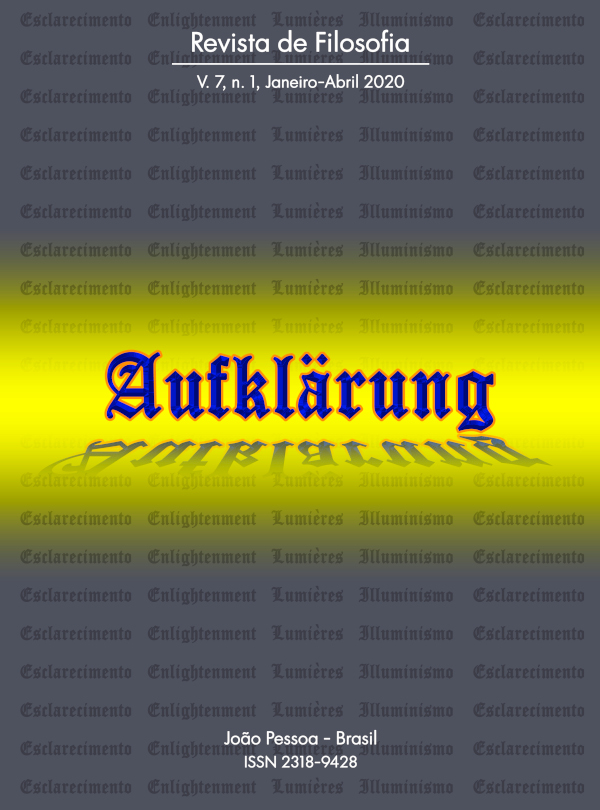Notes on the idea of natural history, or on the calvary of the absolut spirit
DOI:
https://doi.org/10.18012/arf.v7i1.48251Keywords:
Natural History, Philosophy of History, Appearance, CalvaryAbstract
Abstract: This paper examines Adorno's essay Idee der Naturgeschichte (1932). Its goal is to elucidate his main theses and to delimitate the problem of the philosophy of history from an Adornian perspective. The work is part of the author's academic efforts to map the main phases of Adorno's thinking, present in his doctoral thesis. Adorno's interest in the philosophy of history has intensified, taking almost two decades of reflections, culminating in the publication of Dialectic of Enlightenment (1944), a project executed at four hands with Horkheimer. The paper presents then the origins of the concept of natural history, the way in which Adorno criticizes the mystification of the perception of nature operated by the Heideggerian fundamental ontology, the concept of history as nature in Lukács and the concept of nature as history in Benjamin. In addition, it offers an interpretation of the idea of natural history of Adorno from the notion of appearance. The hypothesis that guides this investigation is that, in Adorno’s work, the natural history is thought from a moral theological category, the one of Calvary. Thus Adorno's dialectical reading of the problem of the relation between history and nature leads him to think of natural history itself as the ordeal of the absolute spirit.
Downloads
References
ADORNO, Theodor. A ideia para uma sociologia da música. São Paulo: Abril, 1980.
______. Dialética negativa. Trad. Marco Casanova. Rio de Janeiro: Zahar, 2009.
______. Kierkegaard: construção do estético. Trad. Alvaro Valls. São Paulo: Editora UNESP, 2010.
______. Kierkegaard: Konstruktion des Ästhetischen. Frankfurt am Main: Suhrkamp,1979.
______. Negative Dialektik. Frankfurt am Main: Suhrkamp, 1966.
______. Philosophische Frühschriften. Band I. Frankfurt am Main: Suhrkamp, 1990.
ADORNO, Theodor; HORKHEIMER, Max. Dialektik der Aufklärung: philosophische Fragmente. 22° ed. Frankfurt am Main: Fischer Taschenbuch Verlag, 2016.
______. Dialética do esclarecimento: fragmentos filosóficos. Rio de Janeiro: Jorge Zahar Editor, 1985. Reimpressão de 2006.
ALMEIDA, Robson. Lukács, Benjamin e Adorno: leituras da posição do indivíduo na modernidade a partir da estética. Comunicação na XII Semana Acadêmica da Filosofia da PUCRS, 2013. Disponível em [ebooks. pucrs. br/edipucrs/anais/semanadefilosofia/XII/4. pdf]. Acesso em março de 2018.
BEHRENS, Roger. Adorno – ABC. Leipzig: Reclam, 2003.
BENJAMIN, Walter. O anjo da história. Organização e tradução de João Barrento. Belo Horizonte: Autêntica Editora, 2012.
______. “Ursprung der deutschen Trauerspiel”. In: Walter Benjamin. Gesammelte Schriften. Band I. Frankfurt am Main: Suhrkamp, 1991, pp. 203- 430.
BERLIN, Isaiah. As raízes do romantismo. São Paulo: Três Estrelas, 2015.
BOBKA, Nico; BRAUNSTEIN, Dirk. Die Lehrveranstaltungen Theodor W. Adornos: eine kommentierte Übersicht. IFS Working Paper #8. Heruasgegeben vom Institut für Sozialforschung. Frankfurt am Main: IFS, 2015.
BOFF, Leonardo. Como fazer teologia da libertação. Petrópolis: Vozes, 2010.
DUARTE, Rodrigo. Mímesis e racionalidade: a concepção de domínio de natureza em Theodor W. Adorno. São Paulo: Loyola, 1993.
EISLER, Rudolf. Kant lexikon. Hildescheim: Georg Olms Verlag, 1984.
ELIAS, Nobert. Zwei Reden anlässlich der Verleihung des Theodor W. Adorno-Preises 1977. Ed. de Wolf Lepenis. Frankfurt am Main: Suhrkamp, 1977.
HABERMAS, Jürgen. Na esteira da tecnocracia: pequenos escritos políticos XII. Trad. Luiz Repa. São Paulo: Ed. Unesp, 2014.
_______. O discurso filosófico da modernidade. São Paulo: Martins Fontes, 2000.
HAMM, Christian. Sobre a sistematizabilidade da filosofia da história de Kant. Veritas, Porto Alegre, v. 50, n. 1, março de 2005, p. 67-88.
HEIDEGGER, Martin. Caminhos da floresta. Lisboa: Fundação Calouste Gulbenkian, 1998.
_______. Ensaios e conferências. 8° ed. Rio de Janeiro: Vozes, 1997.
HEGEL, Friedrich. Fenomenologia do espírito: Parte II. Trad. Paulo Meneses. Vozes: Petrópolis, 1992.
_______. Phänomenologie des Geistes. Disponível em . Acesso em julho de 2017.
HETZEL, Andreas. “Dialektik der Aufklärung”. In: Richard Klein; Johann Kreuzer;Stefan Müller-Doohm (Org.). Adorno Handbuch: Leben, Werk, Wirkung. Stuttgart: Springer-Verlag GmbH, 2011.
JAMESON, Frederic. Marxismo tardio: Adorno, ou a persistência da dialética. Trad. Luiz Paulo Rouanet. São Paulo: Editora Unesp, 1997.
JAY, Martin. A Imaginação dialética: história da Escola de Frankfurt e do Instituto de Pesquisa Social (1923-1950). Trad. Vera Ribeiro. Rio de Janeiro: Contraponto, 2008.
KAFKA, Franz. Essencial Franz Kafka. Tradução e seleção de Modesto Carone. São Paulo: Penguin/ Cia das Letras, 2011.
KANT, Immanuel. Idee zu einer allgemeinen Geschichte in weltbürgerlicher Absicht. Berlinische Monatsschrift, November 1784, pp. 385-411. In: . Acesso em março de 2018.
______. Ideia de uma história universal com um propósito cosmopolita. Trad. Artur Morão. In: KANT, Immanuel. A Paz perpétua e outros opúsculos. Lisboa: Edições 70, 2009.
LÖWITH, Karl. Nature, History, Existentialism. Evanston: North-western University Press, 1966.
SAFATLE, Vladimir. Fetichismo e mimesis na filosofía da música Adorniana. Discurso, n. 37, São Paulo, 2007.
SANTOS, Jéverton. Messianismo Tardio: Adorno e a persistência da teologia política. Porto Alegre, PUCRS, PPG em Filosofia, 2019, Tese de Doutorado em Filosofia. Disponível em http://tede2.pucrs.br/tede2/handle/tede/8670.
VAZ, Henrique de Lima. Antropologia filosófica I. 4° ed. São Paulo: Loyola, 1998.
ZUIDERVAART, Lambert. Adorno's Aesthetic Theory: the redemption of illusion. Cambridge: The MIT Press, 1991.
Additional Files
Published
How to Cite
Issue
Section
License
Journal general policy
1.This journal works under a Creative Commons License aplied to online journals. That icence can be read in the following link: Creative Commons Attribution 4.0 International (CC BY 4.0).
2.Accordingly to this License, a)the journal declares that authors hold the copyright of their articles without restrictions, and they can archieve them as post-print elsewhere. b)the journal allow the author(s) to retain publishing rights without restrictions.
Metadata Policy for information describing items in the repository
1. Anyone may access the metadata free of charge at anytime.
2.The metadata may be re-used in any medium without prior permission, even commercial purposes provided the OAI Identifier or a link to the original metadata record are given, under the terms of a CC BY license refered for the Journal.







































